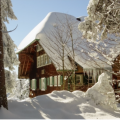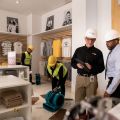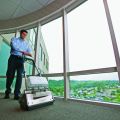8/20/2020
Why You Should and Need to Clean, Sanitize, and Disinfect a Flooded Home Urgently?
8/20/2020
When your house gets flooded, the water can wreak havoc on the structure of the house, your belongings, and the health of the inside environment of your home.
Floodwaters contain many contaminants, bacteria, and lots of mud. Expensive items can get ruined all at once, even with just an inch of water. Some of which are carpeting, wallboard, electrical wires, appliances, and furniture. In severe weather, such as intense storms, heavy rains, or deep flooding, expensive systems like your HVAC, air ducts, roofing, and building foundation can incur more damages.
A flooding incident in your home or business needs immediate cleaning and drying. Proper cleaning helps eliminate the harmful effects of bacterial and viral organisms, and structural drying is also important for mold prevention.
When cleaning out your basement, home, or business after a flood, you need to follow these steps (source: Rhode Island Department of Health).
When cleaning out your basement, home, or business after a flood, you need to follow these steps (source: Rhode Island Department of Health).
Throw away wet materials that can’t be cleaned
- For insurance purposes, take photographs of all the damaged belongings, valuables, and property that you must throw away.
- Wash curtains, clothing, and bedding with hot soapy water. Bleach them whenever possible and then dry and iron them.
- Flush rugs and furniture with clean water, and furniture-friendly shampoo and air-dry them.
Clean safely
- To protect yourself from germs and harmful bacteria in the water, mold on surfaces, and the chemicals in cleaning supplies avoid direct contact. Wear pants, long sleeves, boots, and rubber gloves.
- Protect your eyes, nose, and lungs by using a mask.
- Use soap or cleaning products with a disinfectant for killing germs. Never mix bleach with other cleaning supplies in the same bucket.
- Open windows and use fans to pull fumes from your work area.
- To control dust, avoid dry sweeping. Mist down areas to contain dust and collect the dust with a wet/dry shop vac.
- Always wash your hands thoroughly with soap and warm water or an alcohol-based hand sanitizer when you are done cleaning to avoid contamination and health risks.
Dry flooded areas thoroughly
- Areas that stay wet or damp for more than 48 hours can promote mold growth.
- If carpets, clothing, paper, and other absorbent materials cannot be completely dried, it is best to throw them out rather than keeping them as this can be a great place for mold to thrive.
- Run bathroom and kitchen ventilators to keep the air moving in your home.
- If there is no standing water and it is safe to use electric appliances, use fans to help dry damp areas. Fans mounted in windows and blowing out will not blow dust or mold spores about in living areas.
- Do not pump water out into the sewer system as it will worsen the problems you are already having throughout the state with sewage treatment. Water should be pumped out into your yard or stormwater drain pipes. Professional water extraction companies have the best equipment for this.
- Once things are properly cleaned (disinfected) and dried they should be safe from bacteria and viruses.
Get Help
- If there is a large amount of mold or flood damage, you may want to hire a Water Removal Company in Decatur to help you clean up. If there is still standing water, look for the best Water Extraction Services in Decatur.
- People with asthma, allergies, or other breathing problems may be more sensitive to mold. Talk to your doctor if you aren't sure whether it is safe for you to clean up after a flood.
For your deep cleaning, sanitation and disinfection services in Decatur, ServiceMaster by Lovejoy provides fast response to take care of everything as quickly as possible. We are an Insurance Company-Preferred Vendor, which provides you with an even smoother and proficient solution to your needs.
Call us immediately through these numbers:
Conyers: 678-293-0297
Roswell: 770-992-1575
We will be at your location within 45 minutes of your call. We cover these areas: Atlanta, Sandy Springs, Decatur, Stockbridge, Conyers, McDonough, Stone Mountain, Covington, Social Circle and Dekalb County, and Georgia.
Other articles and publications:
If you suspect you may have mold, call ServiceMaster by LoveJoy today. We’ll help you understand the necessary protocol in safely ridding your home or business of mold contamination. 678-293-0297
Snowstorms can happen anytime, so it is vital to prepare ahead. ServiceMaster by LoveJoy has summarized basic snowstorm preparedness tips to keep you safe and secure this winter.
1/27/2021
Follow these suggestions from our fire restoration experts, and keep your family, home, pets, and belongings safe this holiday season and throughout the New Year.
12/29/2020
ServiceMaster by LoveJoy has compiled some water damage insurance claim tips to help you understand the claims process better and keep the stress to a minimum.
7/22/2021
Water damage losses are separated into three categories, defined by the source and the spread of the water. Learn more.
9/23/2020
Learn three of the top causes of winter water damage and how to reduce your risk from the experts at ServiceMaster by LoveJoy.
12/29/2020
Articles and publications of other companies:
ServiceMaster Cleaning & Restoration's Certified Estimator conducts free, on-site inspections and assessments. Our Project Managers evaluate the loss, identify a proper course of action.
12/17/2020
If your home or business has been affected by a disaster and needs fire damage cleanup, flood cleanup, mold removal, and more, ServiceMaster of Middle Georgia is a name you can trust.
8/26/2020
Not all water damages are created equal. Learn more about the causes, categories, and classes of water damage in this article by ServiceMaster of Cobb.
9/17/2020
When ServiceMaster Restore of Cartersville, GA professionals engage in the restoration of your commercial and residential property, you can be sure you’re getting the best the industry has to offer.
11/26/2020
When ServiceMaster of Cobb of East Ridge, TN professionals engage in the restoration of your commercial and residential property, you can be sure you’re getting the best the industry has to offer.
11/26/2020
ServiceMaster Cleaning & Restoration provides an extensive list of services to both residential and commercial properties in Walker, GA.
12/17/2020










